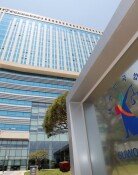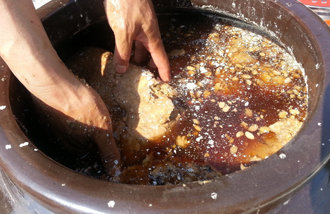China Claims Korean Kimchi Tainted
Is Chinas claim that that parasite eggs have been found in imported Korean kimchi true?
Any country is entitled to investigate and ban harmful food imports.
However, suspicions are being raised over the truth of the accusation, especially because the Korean food industry and the Korea Food and Drug Administration (KFDA) say Korea never exported kimchi to China in the first place.
Chinas dubious announcement-
According to the KFDA and the food industry on November 1, Korea exported 16 tons of kimchi to China as of this year.
But it was confirmed that Dongwon F&B, Doosan, CJ, Pulmuone, and Doturak, the food companies accused by the Chinese food safety office, the General Administration of Quality Supervision, Inspection and Quarantine (AQSIQ) of producing kimchi containing parasite eggs, had never exported kimchi to China this year.
Although Dongwon F&B has a kimchi plant in China, all the exports go to Japan.
Doosan sells kimchi to China, but since all of it is made locally in China, its products are not the Korean-made food imports as claimed by China.
It is not even certain whether the concerned kimchi products are really made by Korean companies because the names of affected businesses and products remain unclear.
At the website of the Chinese food safety office, Yangban kimchi of Dongwon is dubbed Literati kimchi, with Dongwon in Chinese spelt in wrong letters.
Doosans Jongga kimchi was also written in letters merely following the sounds instead of using the Chinese characters used in Korea.
Spices for red-pepper paste and Bulgogi are sterilized before export, so food specialists believe that parasite eggs would have a difficult time surviving.
Lee Chang-jun, the head of the food safety policy team at KFDA said, Parasite eggs are killed when heated at 70 Celsius degrees for a second or 60 degrees for over five seconds, so there is little possibility of parasites surviving as Korean businesses heat red-pepper paste for five minutes at 85 to 95 Celsius degrees, and two to five minutes at 85 degrees for Bulgogi spices.
Retaliation?-
Officials from the Korean Embassy to China and the Chinese Embassy to Korea were in agreement, saying, China has pent-up complaints, and this is nothing new.
The Ministry of Foreign Affairs and Trade says that China has constantly been complaining about Koreas method of announcing and dealing with safety concerns surrounding Chinese food imports, including kimchi, tea, and eel.
AQSIQ Director-General Lee Changjiang said in his talks with the Korean Minister of Maritime Affairs and Fisheries Oh Keo-Don on October 26 that there are problems with Korean products imported to China, but we do not always make official announcements about them.
This is an expression of protest against Koreas method of making contaminated food discoveries public.
According to KFDAs explanations, this is a typical Chinese tactic of retaliation through power, said trade attorney Jeong Young-jin.
Potential trade war would hurt both governments-
It is also likely that China is insisting Korean kimchi is tainted while Korea presents evidence pointing to the opposite.
The WTO Agreement on the Application of Sanitary and Phytosanitary Measures (The SPS agreement) specifies that import bans can be enforced when objective scientific evidence on toxicity is presented, but it is unclear as to what objective scientific evidence is.
The most reasonable solution is common research between the two countries, said Gwak Noh-seong, an international trade professor at Dongguk University, who predicted, As the two countries have decided to promptly launch a Korean-Chinese high-level council on quality inspection, the issues will likely be hammered out at a certain level.
Analysts believe that Chinas latest move will not escalate into all-out trade friction even though it may be a retaliatory warning message. The two countries have too much at stake to wage an all-out war.
China emerged as Koreas largest trade partner last year, overtaking the U.S. Excluding Hong Kong and the Virgin Islands, Korea is the number one investor in China.
There is also speculation that concerns over some foods will not lead to import restrictions on other products as was the case in a previous dispute over garlic because China is now a WTO member.
Lawyer Jeong explained, China will have to violate many WTO rules to take retaliatory action against Korean products, but this would not be easy.
Headline News
- Security strengthened at residences of U.S. presidential candidates
- Late-night announcement issued on Pres. Yoon’s public address
- Green Belt in Seoul to be released in 12 years
- Meta fined 20 billion won for illegally collecting sensitive information
- Culture Ministry calls for severe disciplinary action against KFA chair







